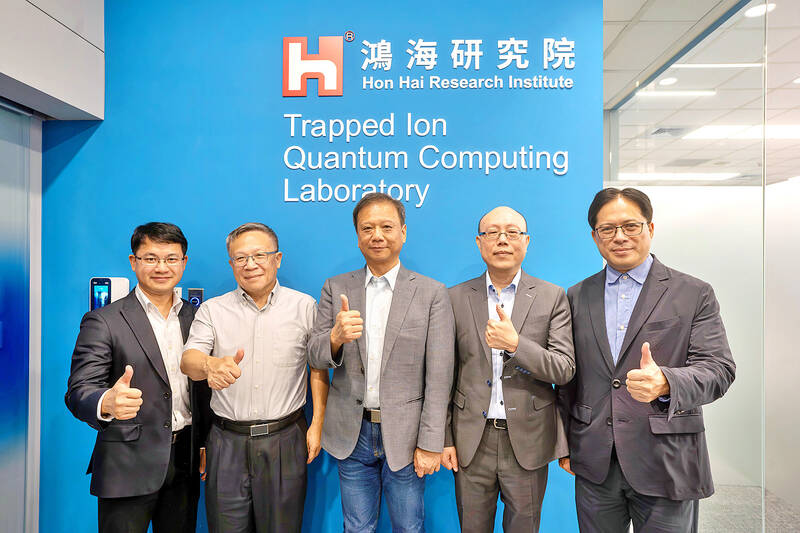Hon Hai Precision Industry Co’s (鴻海精密) research institute yesterday launched a laboratory for trapped-ion quantum computing in New Taipei City’s Sindian District (新店) as part of Hon Hai’s “3 plus 3” transformation initiative, the company said in a statement.
The “3 plus 3” initiative refers to developing three emerging sectors — electric vehicles, robots and digital healthcare — through the use of artificial intelligence, semiconductors and communications technologies, Hon Hai has said.
The lab, operated by the Hon Hai Research Institute, is at the Baogao Science and Intellectual Park (寶高智慧產業園區) in Sindian. It is the first of its kind in Taiwan, focusing on the development of efficient computing capabilities required for new generation artificial intelligence and automotive-related technologies, Hon Hai said.

Photo courtesy of Hon Hai Precision Industry Co
Trapped Ion Quantum Computing Laboratory director Lin Guin-dar (林俊達), sees quantum computing as the “holy grail” for next-generation technology development, but not something that could be achieved overnight, the statement said.
“This lab is an important experimental field for Taiwan’s industry,” Lin said in the statement, adding that the Hon Hai Research Institute would continue to invest in the field, accumulate experience and integrate talent, resources and technologies at home and from abroad.
Planned and built by the research institute for nearly two years, the lab is committed to building universal quantum computers based on trapped ions, Hon Hai said.
The lab aims to explore key technology research, including quantum control, scalable computer architectures, and chips integrating micro-ion traps and optoelectronics circuits, it said.
In addition, “this laboratory will also combine Hon Hai group’s capabilities and talents in precision manufacturing, semiconductors and packaging to accelerate quantum hardware technology development and further grow the related tech sectors,” the company said.
Hon Hai plans to introduce new-generation multi-zone ion traps at its annual Tech Day event on Wednesday at the Taipei Nangang Exhibition Center’s Hall 2.
The event is also expected to showcase the company’s progress in electric vehicles and artificial intelligence applications for smart cities and factories, as well as the latest developments in low-orbit satellites and digital health.

TAKING STOCK: A Taiwanese cookware firm in Vietnam urged customers to assess inventory or place orders early so shipments can reach the US while tariffs are paused Taiwanese businesses in Vietnam are exploring alternatives after the White House imposed a 46 percent import duty on Vietnamese goods, following US President Donald Trump’s announcement of “reciprocal” tariffs on the US’ trading partners. Lo Shih-liang (羅世良), chairman of Brico Industry Co (裕茂工業), a Taiwanese company that manufactures cast iron cookware and stove components in Vietnam, said that more than 40 percent of his business was tied to the US market, describing the constant US policy shifts as an emotional roller coaster. “I work during the day and stay up all night watching the news. I’ve been following US news until 3am

Six years ago, LVMH’s billionaire CEO Bernard Arnault and US President Donald Trump cut the blue ribbon on a factory in rural Texas that would make designer handbags for Louis Vuitton, one of the world’s best-known luxury brands. However, since the high-profile opening, the factory has faced a host of problems limiting production, 11 former Louis Vuitton employees said. The site has consistently ranked among the worst-performing for Louis Vuitton globally, “significantly” underperforming other facilities, said three former Louis Vuitton workers and a senior industry source, who cited internal rankings shared with staff. The plant’s problems — which have not

TARIFF CONCERNS: The chipmaker cited global uncertainty from US tariffs and a weakening economic outlook, but said its Singapore expansion remains on track Vanguard International Semiconductor Corp (世界先進), a foundry service provider specializing in producing power management and display driver chips, yesterday withdrew its full-year revenue projection of moderate growth for this year, as escalating US tariff tensions raised uncertainty and concern about a potential economic recession. The Hsinchu-based chipmaker in February said revenues this year would grow mildly from last year based on improving supply chain inventory levels and market demand. At the time, it also anticipated gradual quarter revenue growth. However, the US’ sweeping tariff policy has upended the industry’s supply chains and weakened economic prospects for the world economy, it said. “Now

COLLABORATION: Given Taiwan’s key position in global supply chains, the US firm is discussing strategies with local partners and clients to deal with global uncertainties Advanced Micro Devices Inc (AMD) yesterday said it is meeting with local ecosystem partners, including Taiwan Semiconductor Manufacturing Co (TSMC, 台積電), to discuss strategies, including long-term manufacturing, to navigate uncertainties such as US tariffs, as Taiwan occupies an important position in global supply chains. AMD chief executive officer Lisa Su (蘇姿丰) told reporters that Taiwan is an important part of the chip designer’s ecosystem and she is discussing with partners and customers in Taiwan to forge strong collaborations on different areas during this critical period. AMD has just become the first artificial-intelligence (AI) server chip customer of TSMC to utilize its advanced